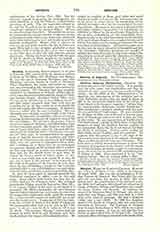

Severus, ALEXANDER, Roman emperor, b. at Acco in Palestine, 208; murdered by his mutinous soldiers at Sicula on the Rhine, 235 (Sicklingen near Mainz). He was the son of Genessius Marcianus and Julia Mammaea, and was known in youth as Alexianus. When Elagabalus, his cousin and father by adoption, was murdered in 222, Alexander succeeded to the imperial throne. His education had been carefully conducted by Mamma at Antioch; whither she invited, some time between 218 and 228, the great Christian teacher, Origen. Eusebius relates (Hist. eccl., VI, xxi-xxviii) that she was “a very religious woman”, and that Origen remained some time with her, instructing her in all that could serve to glorify the Lord and confirm His Divine teachings. It does not, however, follow that she was a Christian. Her son Alexander was certainly very favorable to the Christians. His historian, Lampridius, tells us several interesting details concerning this emperor’s respect for the new religion. He placed in his private oratory (lararium) images of Abraham and Christ before those of other renowned persons, like Orpheus and Apollonius of Tyana (Vita Alex., x) dx); he tolerated the free exercise of the Christian faith (“Christians esse pasus est”, ibid., xxii); he recommended in the appointment of imperial governors the prudence and solicitude of the Christians in the selection of their bishops (ibid., xlv); he caused to be adjudged to them (ibid., xlix) a building site at Rome that the tavern-keepers (cauponarii) claimed, on the principle that it was better that God should be in some way honored there than that the site should revert to such uses; he caused the famous words of Christ (Luke, vi, 31): “And as you would that men should do to you, do you also to them in like manner” to be engraved on the walls of the palace of the Caesars; he even cherished the idea of building a temple to Our Lord, but refrained when it was said to him that very soon all the other divinities would cease to be honored (ibid., xliii).
In spite of these signs of imperial goodwill, the Christians continued to suffer, even in this mild reign. Some writers think that it was then that St. Cecilia died for the Christian faith. His principal juris consult, Ulpian, is said by Lactantius (Inst. Div., V, ii) to have codified, in his work on the duties of a proconsul (De officio proconsulis), all anti-Christian imperial legislation(rescripta principum), in order that the magistrates might more easily apply the common law (ut doceret quibus oportet eos paenis affici qui se cultores Dei confiterentur). Fragments of this cruel code, from the seventh of the (ten) lost books of Ulpian on the proconsular office may yet be seen in the “Digests” (I, tit. xvi; xvii, tit. II, 3; xvliii, tit. IV, 1, and tit.) iii, 6). The surname “Severus”, no less than the manner in which both he and Mammaea met their death, indicate the temper of his administration. He sought to establish at Rome good order and moral decency in public and private life, and made some use of his power as censor morum by nominating twelve officials (curatores urbis) for the execution of his wise dispositions. He seems to have been a disciple of the prevailing religious “syncretism” or eclecticism, established at Rome by his predecessor Elagabalus as the peculiar contribution of this remarkable Syro-Roman family to the slow but certain transformation of the great pagan Empire into a mighty instrument of Divine Providence for the healing of the moral ills that were then reaching fullness. All historians agree as to his life, and the moral elevation of his public and private principles; Christian historians are usually of opinion that these elements of virtue were owing to the education he received under the direction of Origen.
THOMAS J. SHAHAN

